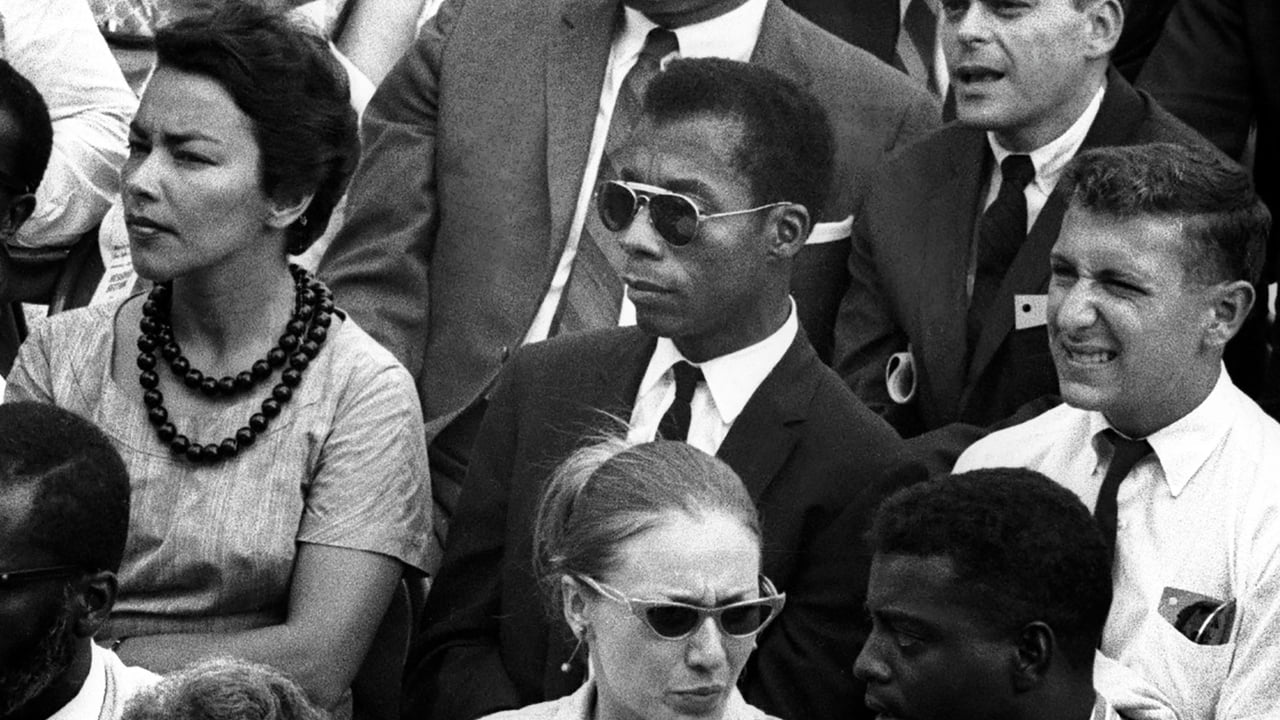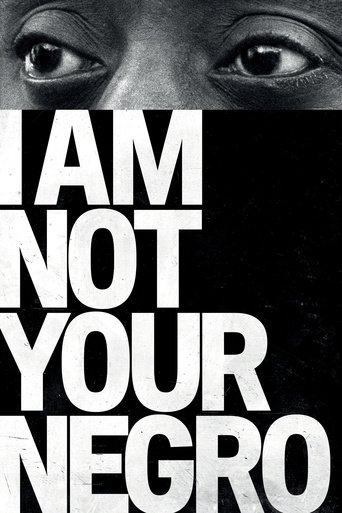

Highly Overrated But Still Good
... View MoreThis is one of the few movies I've ever seen where the whole audience broke into spontaneous, loud applause a third of the way in.
... View MoreThe movie's not perfect, but it sticks the landing of its message. It was engaging - thrilling at times - and I personally thought it was a great time.
... View MoreStrong acting helps the film overcome an uncertain premise and create characters that hold our attention absolutely.
... View MoreI Am Not Your Negro (2016) *** 1/2 (out of 4) James Baldwin was writing a book about the deaths of Martin Luther King, Jr., Medgar Evers and Malcolm X as he also covered the history of blacks in America. This book was never completed but Raoul Peck updates it and brings it into current times.Samuel L. Jackson turns in one of the greatest performances of his career as he works as the narrator and the voice of Baldwin. I was really amazed at how terrific Jackson was as he really got into the role and delivered an emotional and raw performance even though he's just using his voice. There's been a lot said about this movie and I'd agree with most that it's an important film and one that should be shown to young people. Lets face it, a lot of young people simply don't care about any sort of history but this film gives it in a unique way that anyone can enjoy.We get the stories of King, Evers and Malcolm X told and I really loved the delivery. Of course, all three were murdered and the way this is told is extremely moving and even though you know the fate of the three, the documentary is so well-made that you can't help but "feel" their deaths as if you were hearing about them for the first time. The words of Baldwin are quite sharp and he makes some very interesting comments about not only the three men but also Hollywood going back to the films of the 30s with Joan Crawford right up to the work of Sidney Poitier.I'm not going to sit here and lie. Whenever you're dealing with a political subject you might not agree with everything in a film. I personally don't care too much for the whole BlackLivesMatter movement so when the film mixed that in I wasn't all that interested. Still, there's no question that this is a very education and wonderfully made film that everyone should see.
... View MoreThis documentary is without a doubt one of the greatest documentaries regarding the black (and white) experience in America. I was glued. You if you have not seen it I say it is a MUST SEE.I was riveted to it and cried through it because I remember the times of which it spoke and it spoke to me. In the end Baldwin says "Not everything that is faced can be changed but nothing can be changed that is not faced." I believe if one sees it it should speak to you. It should especially in this hour of Trump be required viewing in this nation in every school of this nation. I was so moved! This must see is profoundly brilliant. White supremacists and Trump SHOULD see it but I am sure will not. If they do it should make him and them feel profoundly guilty for the racist divide they are helping perpetuate. United we stand but divided we surely will fall. Those who view this piece of artistic excellence should heed what it has to say.
... View MoreA brilliant cine-essay that uses James Baldwin's electrifying prose as a launch pad for a critique of Hollywood cinema-as-embodiment-of-the- American-ego. The ego, in Freudian terms, is the mask of the unconscious, but one can trace the true nature of that unconscious by examining the ego, as one can map a face by feeling its contours through a mask. The N----- is, the film argues, the foundational character of the story Amerika tells itself about itself. For the N is the castrated other, the desexualized one that assures the viewer they have Power. Does not this imaginary embodiment of castration point to the puritanical impotence of the self? Is the most violent empire in history, which elected the likes of Donald Trump as its representative, not built by and for the needs of cowards?
... View MoreI'm not your Negro" directed by Haitian Raoul Peck, is based on the unfinished writing of James Baldwin on the lives and deaths of three prominent figures of the Civil Rights Movement of the sixties, Martin Luther King, Malcolm X, and Medgar Evers, all, three of whom were assassinated before the reached the age of forty. Before the main title we see a clip of Baldwin on the Dick Cavett talk show, which will be reprised several,times during the film. Baldwin is himself the person most seen throughout, the star of the film, so to speak -- but others include Malcolm X, Luther King and Evers, plus Robert Kennedy who was also assassinated within the same time frame, and, of course, Sidney Poitier and Harry Belafonte. A long sequence from Stanley Kramer's "The Defiant Ones" shows Tony Curtis and Poitier on the lam but bound together by prison chains, forced to cooperate in order to survive even though they hate each other -- the best clip in Peck's film. Many other clips were I thought far less irrelevant to director Peck's intended massaging -- basically, it seems, intended to make white viewers feel guilty. We see Baldwin addressing an enthusiastic crowd at Cambridge in England and a number of other similar scenes spaced out throughout the picture as he becomes an international celebrity. There is much graphic footage of violent police brutality against black demonstrators with Baldwin's commentary heard over --and hateful white demonstrations against "niggers" right up to the present day -- Ferguson, etc., but randomly interspersed. The overall tone of the film is quite bleak delivering the message that it is up to white America to change their indifferent attitude on race relations if they are ever to improve to the point where negroes are totally accepted and integrated fully into the society, while not holding out much hope that this will ever be achieved. The only slight ray of Hope is a flash of Black president Obama and his wife, after we see Baldwin wryly saying that, within another forty years a black man might become president "If we behave ourselves" -- oddly enough it was just exactly forty years later that Obama was elected. Peck makes extensive use of film clips from Hollywood movies (Dori Day, etc.) meant to demonstrate the complacency of White America and their lack of concern for the plight of black people. John Wayne is shown in an extended clip from Stagecoach shooting down Indians right and left. References to the Wounded Knee massacre and other atrocities against native Americans are used to imply that the Negroes who were raised as children to root for John Wayne are actually victims just like the Indians and should have been identifying with the Indians not the cowboys. The picture is divided into sections with chapter like headings on a Horizontally split black and white screen as a visual metaphor for the black white racial divide. In between poetic visual sequences not really related to the main line of the narration are inserted for some kind of effect which I found pointless and distracting filler. J. Edgar Hoover, notorious head of the FBI puts Baldwin on a dangerous persons list to be watched and underlines his homosexuality because of his outspoken anti-Racism. However, Baldwin was not nearly as radical as some of his contemporaries. He disavows the Black Panthers on the grounds that their ideology which demonizes all white people, is simply untrue. Not all white people are devils. He also refuses to identify with the NAACP movement on the grounds that it tends to promote divisive class distinctions in the black community. in sum, Baldwin was an independent thinker whose thought never strayed from demanding that the white community as a whole must take responsibility for their racism and deal with it honestly on their own. He lived most if his adult life as an ex-pat in France. While this film gives a detailed summary of racism and anti-racism in the sixties my feeling was that it is rather heavy handed and incoherent in a way that Baldwin himself might not have been very happy with. Moreover, rather than make me feel a sense of responsibility as a white person, it mainly served to make me realize how basically alien American black culture is to me. All in all I was disappointed in the film although I came to it with very high expectations. At the five PM screening at the Music Hall cinema in Beverly Hills there were only five viewers besides myself. The film is not packing them in. Seems to me Europeans are more interested in American race relations than well off white Americans. It was far better attended and positively reviewed at the Berlin film festival.
... View More